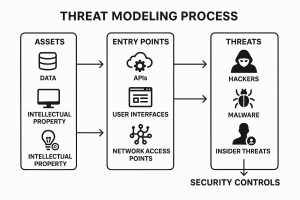DevOps is one of software development’s most widely adopted automation processes. DevOps engineers are responsible for accelerating the development of products and frequent releases of updates. Some of the most renowned companies in the world, such as Google, Netflix, and Amazon, use this methodology to increase the efficiency and productivity of their teams.
According to market research, the expansion of DevOps is expected to reach $287.9 billion by the year 2026. This growth will demand more DevOps engineers to join the engineering teams. If you are wondering about the future of DevOps technologies, the prospects are up-and-coming.
This article explores the future of DevOps technologies and how organizations are improving the development culture by implementing this methodology.
What is DevOps?
DevOps is the methodology that provides an alternative to the agile development environment for creating faster and smoother development of applications. It is a continuous process that also includes last-mile delivery. This methodology ensures that product testing, development, and operation are in sync and that delivery can be made in less time. Several processes are involved in DevOps, such as voting, building and integration, continuous testing, reporting, monitoring, and configuration.
For a successful career as a DevOps engineer, you need to focus on building skills in the following technologies.
1. AI/ML in the DevOps
The DevOps methodology has made the software development life cycle much more efficient. Combined with a cloud-native approach and microservice architecture, it is possible to build any software with limited resources and time. With this approach, you can integrate testing and production environments to find problems with the application before it goes live proactively.
But there is scope for further improvement in DevOps pipelines by applying artificial intelligence and machine learning. With these technologies, you can build and automate much better, which is why the industry is gradually transitioning from DevOps to DataOps and AIOps. The focus is shifting to using artificial intelligence and machine learning technologies to log and monitor metrics that give more control automatically. It would help if you learned tools like Moogsoft and BigPanda, a leader in AIOps.
2. Serverless computing
DevOps teams are actively using serverless architecture for maintaining their production pipelines because of the massive operational cost of server infrastructure. DevOps automates software development and deployment based on several components. When you get a modular component view of the pipeline, it becomes much easier to identify the bottlenecks and unnecessary server resources. The serverless architecture can mitigate the challenges common to the product’s deployment and development.
If you plan to become a DevOps engineer, you should learn how serverless computing can streamline overall DevOps operations. Companies prefer serverless architecture because it dramatically reduces server maintenance costs and workloads. The flexibility, reliability, cost efficiency, and speed of serverless DevOps infrastructure improve the efficiency of the complete software life cycle from development to deployment.
3. Low-Code/No-Code applications
Many organizations are adopting the low-code/no-code development approach to deploy applications swiftly and to keep up with the demand for new features and applications from users. DevOps engineers experience higher agility and can develop fast-track applications to meet the market’s demand. Adopting a low-code approach in the DevOps framework is a game changer.
With no-code application development, you can allow non-technical contributors to be part of software development through the help of visual interface integrations. As DevOps engineers play an essential role in connecting end users with developers, they play a crucial role in adopting this trend. This is another DevOps technology that you should focus on.
4. Container technology
Another technology that is evolving fast and emerging strongly is container technology. Containers are handy for sandbox applications for security or resource constraints reasons. There are also instances when companies use containers per user or user session to micro-monitor the behavior of their products. Including container technology in DevOps allows limitless possibilities to improve user and system security and enhance user analytics.
Simply put, container technology allows putting all the software components in a single unit that can be used to run microservices or larger applications alike. All the code, libraries, configuration information, and other dependencies can be withheld in this container, making it much smoother to deploy software across the network. Another reason why this DevOps technology is becoming popular is because of its lightweight architecture. Unlike deploying full-scale servers to test applications, containers make it possible to deploy multiple versions of the same application and multiple operating systems.
Conclusion
DevOps is evolving fast and driving a significant transformation in the software industry. The DevOps technologies we have listed here are helping organizations to move rapidly beyond simple automation and enhance their ability to design, produce, launch, and maintain high-quality software products. As a DevOps engineer, you must familiarize yourself with these technologies for a successful career.
Talent500 helps start-ups and Fortune 500 companies to build remote engineering teams. Join us here and explore career-redefining opportunities at some of the largest tech companies.



